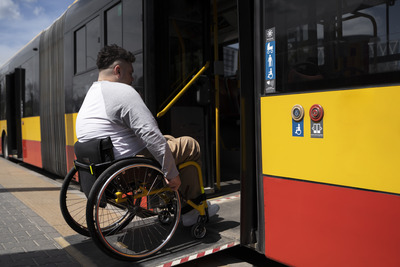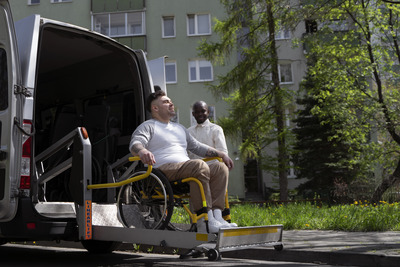In the realm of disability support, there exists a transformative journey; a journey that transcends the mere act of moving from one place to another. It’s a journey that’s steeped in inclusivity, specialized care, and community engagement. This is the realm where NDIS Transport Support emerges as a guiding star.
The magic of NDIS Transport Support lies not merely in the wheels that turn but in the doors, it opens; doors to specialized disability accommodations and services that are as unique as the individuals they cater to.
This support is not just about transportation; rather it’s about mobility. It is a narrative of empowerment, independence, and authentic inclusivity. And this is a narrative that celebrates the resilience and potential of individuals with disabilities.
It’s a journey into a world of possibilities, an exploration of how mobility becomes a gateway to a life that’s not only accessible but also enriched with support and opportunities.
So, let’s embark on this journey together with Merri Community Care as we uncover the power of NDIS Transport Support and how it transcends mere transportation, becoming a symbol of empowerment, inclusivity, and independence!
How Transport Support is Empowering Journeys?

In this journey called life, the ability to move freely and independently is a fundamental right. However, many of us take this for granted. Yet, for people with disabilities, the simple act of getting from one place to another can be an intricate puzzle filled with barriers.
These challenges they face in even such small tasks extend beyond the physical realm. This eventually impacts various aspects of their lives. However, there’s a beacon of hope that shines brightly in this landscape of hurdles. The hope is named the “National Disability Insurance Scheme” which is committed to eliminating on only this but every barrier affecting individuals with disabilities lives. .
NDIS is such a system that transcends being merely a framework for assistance; it is a comprehensive system designed to empower individuals to embrace life with independence, dignity, and inclusivity.
This remarkable initiative is centered on the elimination of barriers that have long impeded the journey of those with disabilities, encompassing not only housing but also healthcare, therapies, personal assistance, and one of life’s most fundamental aspects: transportation!
As we talk about services, NDIS offers an array of services other than transportation, each tailored to provide comprehensive support for individuals with unique needs. These services go beyond the basics and encompass everything from Specialist Disability Accommodation to offer secure, accessible housing options, to therapies, healthcare, and personal assistance, ensuring that individuals receive the holistic support they need.
Coming back to the topic, first, let’s have an in-depth exploration of how individuals with disabilities face transportation-related challenges in their everyday lives and then we will explore how NDIS is transforming lives!
Everyday Struggles due to Transportation Barriers
There are so many transportation challenges posing substantial obstacles in the lives of individuals with disabilities. These challenges act as formidable barriers to achieving the fulfillment and inclusivity they rightfully deserve. These multifaceted difficulties encompass:
· Limited Independence:
No matter how small an outdoor task may be, accessible transportation is required for it. Nonetheless, a lack of accessible transportation can turn the simplest of errands into significant hurdles.
It places individuals with disabilities in a position of dependency that limits their freedom and independence. The inability to travel independently can lead to helplessness and frustration, impacting their overall quality of life.
· Barriers to Services:
Inaccessibility of transportation means the inability to go out. This inaccessibility can seriously obstruct access to various crucial services for example medical appointments, therapy sessions, or even vocational training.
These kinds of barriers greatly hinder personal development and well-being. People with disabilities may miss out on essential healthcare or educational opportunities due to a lack of accessible transportation, impacting their overall health and personal growth.
· Social Isolation:
Transportation is required for every task regardless of where it must be conducted. However, this inability to move freely even within their communities does not only affect individual wellbeing but also leads to social isolation.
Isolation arises when individuals cannot partake in social activities, attend community events, or visit loved ones. A lack of accessible transportation can result in loneliness and a sense of disconnection from the community, which can have adverse effects on mental health.
· Employment Challenges:
Inaccessible transportation not only hinders access to job interviews but also restricts daily commutes, limiting employment opportunities. Many talented individuals with disabilities may find their career prospects stymied due to transportation challenges, preventing them from contributing their skills and expertise to the workforce.
· Healthcare Hurdles:
Access to healthcare services can further become a complex ordeal. Routine check-ups and urgent medical attention may not be readily accessible, leading to delayed treatment and deteriorating health conditions. The impact of this can be significant, as delayed medical care can lead to unpreventable health complications.
· Educational Limitations:
Children and adults with disabilities face educational obstacles when transportation barriers impede access to schools and training programs, undermining their personal and professional growth. These limitations can hinder their educational and career aspirations, denying them opportunities to reach their full potential.
As a result of all these limitations, the emotional toll is substantial, and the financial strain is significant. What should be a simple journey from one point to another transforms into a complex, costly endeavor. Physical strain can take a toll as well, especially for those navigating environments ill-equipped for their needs. Overcoming these obstacles often requires significant effort and resources
Life-Changing Results by NDIS Transport Support
Within the vast spectrum of NDIS services, NDIS Transport Support stands as a lifeline for individuals seeking to break free from the shackles of transportation challenges. For those facing the daily struggles of limited mobility, the inability to access crucial services, and a life marked by dependence, NDIS Transport Support is the key to unlocking new horizons!
Here is how it is transforming lives:
· Vehicle Modification for Personalized Mobility
When it comes to personalized mobility for individuals with disabilities, NDIS goes beyond the basics by offering comprehensive support for vehicle modifications. This encompasses a wide range of adaptations, from wheelchair-accessible vehicle modifications to hand controls and other adjustments that cater to unique mobility requirements.
The goal is to transform vehicles into personalized, accessible modes of transportation, giving individuals the freedom to journey as they wish.
Here are the types of modifications one can get:
o Wheel-Chair Accessible Vehicle Modifications
For individuals who rely on wheelchairs, NDIS provides support to transform regular vehicles into accessible ones. This adaptation often includes features like ramps, wheelchair lifts, or lowered vehicle floors, ensuring that wheelchairs can be accommodated comfortably. These modifications empower individuals to travel without the constraints of limited mobility.
o Hands Control for Enhanced Independence:
Individuals with limited use of their legs can benefit from specialized hand controls. These systems enable them to operate the accelerator, brake, and steering with their hands, providing the independence to control their vehicles.
o Seating and Transfer Aids:
Comfortable and accessible seating is crucial. NDIS can modify seating arrangements with features like swivel seats, transfer aids, or specialized cushions, making it easier to get in and out of the vehicle.
o Steering Aids for Improved Control:
Dexterity challenges can be addressed with steering aids. These adaptations make turning the steering wheel more accessible, ensuring that individuals have complete control over their vehicles.
o Additional Support Equipment:
Furthermore, NDIS offers additional support equipment, such as vehicle hoists, assistive devices for entering and exiting the vehicle, and other tailored solutions that enhance overall accessibility and safety.
· Bridging Essential Services through Community Support
NDIS recognizes the need for accessible community transport services to enable individuals to access facilities, and educational institutions, and to participate in a variety of social activities.
This support extends to accessible buses and vehicles operated by trained professionals, making mobility and inclusion more than just words on paper. Understanding the importance of breaking down the transportation barriers that have long hindered inclusion and independence, NDIS offers:
o Access to Healthcare Facilities:
One of the primary aspects of community transport is providing individuals with disabilities easy access to healthcare facilities. This includes hospitals, clinics, and therapy centers. Whether it’s a routine check-up or a critical medical appointment, individuals can rely on accessible transport to ensure they receive the care they need.
o Inclusive Education:
Educational institutions should be accessible to all. Community transport ensures that individuals can attend schools, colleges, and training programs without any limitations. This support plays a crucial role in empowering students to pursue their academic goals and build their futures.
o Social Involvement and Activities:
Social activities are an essential part of a fulfilling life. NDIS understands that individuals with disabilities should have the opportunity to participate in community events, gatherings, and recreational activities. Accessible buses and vehicles operated by trained professionals make this possible.
o Training and Workshops:
For those individuals seeking employment or vocational training, community transport serves as a lifeline. It enables them to attend job interviews, training programs, and workplaces, breaking down the barriers that might hinder career prospects.
o Trained Professionals for Assistance:
It’s not just about having accessible vehicles; it’s also about having skilled individuals who can operate them or who can guide individuals with disabilities on their path. Community transport services provide trained NDIS support workers who ensure that individuals with disabilities can travel safely, comfortably, and with the support they may require during the journey.
· Funding for Specialized Transport
Accessing services without appropriate funding is next to impossible! This is why NDIS provides funding for specialized Transport Support and Services too. This support is pivotal in ensuring that individuals with disabilities can access critical appointments, therapeutic sessions, educational commitments, and employment opportunities without the hindrance of transportation challenges. With the goal of eliminating transportation as a barrier to personal and professional growth in mind, NDI offers funding for:
o Crucial Appointments:
NDIS recognizes that timely access to appointments with healthcare professionals and specialists is essential for individuals with disabilities. Whether it’s a medical check-up, a consultation with a therapist, or any other crucial healthcare appointment, the funding ensures that individuals can attend these appointments without any transportation-related barriers.
o Therapeutic Sessions:
A healthy body requires a healthy mind too. For many individuals with disabilities, regular therapeutic sessions are a vital part of their care. This can encompass physical therapy, speech therapy, counseling, and more. NDIS funding for specialized transport means that individuals can attend these sessions consistently, ensuring that they receive the support they need for their overall well-being and development.
o Educational Commitments:
Education is a fundamental right, and NDIS ensures that individuals with disabilities have access to educational institutions without limitations. This funding supports transportation to schools, colleges, training programs, and other educational commitments, enabling students to pursue their academic goals and build their futures.
o Employment Opportunities:
The main aim of NDIS is to empower individuals to lead an independent life and for this, employment is crucial. Thus, it empowers individuals to seek employment and vocational training opportunities. The funding for specialized transport ensures that they can attend job interviews, training programs, and workplaces without transportation being a hindrance. This opens doors to a world of career prospects and personal growth.
· Support for Accessible Vehicles
Accessible vehicles are far more than just modes of transportation; they are the gateways to independence for individuals with disabilities. NDIS acknowledges this vital aspect and goes to great lengths to provide substantial support for both the acquisition and maintenance of these specialized vehicles.
This support encompasses a range of options, from wheelchair-accessible vans to various other specialized transport solutions. Here’s a closer examination of how NDIS empowers individuals with disabilities to meet their unique mobility requirements without hindrance:
o Wheelchair Accessible Vans:
It would not be wrong to say that these Wheelchair Accessible Vans are the key aspects of NDIS transport support. These vehicles are meticulously designed to cater to the specific needs of individuals who rely on wheelchairs for their mobility.
They feature ingenious adaptations such as ramps, lifts, and modified interiors. This thoughtful design enables individuals to remain comfortably seated in their wheelchairs, securely fastened during the journey.
o Other Specialized Transportation Options:
NDIS recognizes the diversity of mobility requirements among individuals with disabilities. Therefore, support extends beyond just wheelchair-accessible vans. NDIS embraces a holistic approach by providing various other specialized transport options.
These alternatives are equipped with an array of specific adaptations that cater to individual needs. For instance, as mentioned above, swivel seats are invaluable for those who require ease of access as they offer independence to those with specific dexterity challenges.
o Acquisition and Maintenance:
Sure NDIS helps with the acquisition process. Nonetheless, NDIS’s commitment to accessible vehicles doesn’t stop at acquisition. It extends to the long-term well-being of these vehicles. The scheme ensures that individuals not only have access to these specialized vehicles but also provides robust support for their ongoing maintenance.
This includes funding for the purchase of accessible vehicles and continuous financial assistance to ensure that these vehicles remain in excellent working condition. Maintenance support guarantees that these vehicles are always ready for use, contributing to the peace of mind of their owners.
· Individualized Mobility Solutions
NDIS is known for the sake of its personalized solutions. Even at the heart of NDIS’s approach to accessible vehicles lies a profound recognition of individuality. The scheme takes into account that each person’s mobility requirements are unique.
Thus, the support for accessible vehicles is tailored to address these specific needs. This ensures that the individual’s mode of transportation aligns perfectly with their mobility requirements. This personalized approach is a hallmark of NDIS, affirming that every individual’s journey toward independence is distinct and worthy of respect and consideration.
Here is how NDIS takes into account every aspect of individual needs in order to thoroughly fulfill them:
o Acknowledging Individual Uniqueness:
NDIS begins its approach to transport support by acknowledging the individuality of each person’s needs. This is a fundamental recognition that no two individuals are the same, and their transportation requirements are as diverse as they are. By starting with this acknowledgment, NDIS sets the stage for a truly inclusive and empowering approach to transport.
o Assessment of Unique Needs:
If you are aware of the NDIS process, you will know that it always ensures to provide personalized support. In an aspect of transport, this personalized transport planning process begins with an in-depth assessment of the individual’s unique requirements.
This assessment takes into account the person’s mobility challenges, the type of support they need during transportation, and their personal preferences regarding the mode of travel and assistance required. For instance, if they require vehicle modification or guidance from an NDIS worker etc
o Tailored Transport Solutions:
Based on the assessment, NDIS works to craft tailored transportation solutions that are aligned with the individual’s needs. This might include the selection of accessible vehicles, the arrangement of specialized support, and the scheduling of transport services that fit seamlessly into the individual’s daily routine.
o Flexibility and Choice:
NDIS places a strong emphasis on flexibility and choice. It is crucial for individuals to have a say in how they wish to travel. Personalized transport planning ensures that the individual’s preferences are taken into account, offering them choices in terms of scheduling, route selection, and modes of transportation.
o Support for Independence:
Beyond the practical aspects of transportation, personalized transport planning is ultimately about supporting independence. It empowers individuals to take control of their journeys, giving them the confidence to access essential services, engage with their communities, and pursue their personal and professional goals.

Eligibility for NDIS Transport Support – Who can Qualify?
Access to NDIS transport support is a crucial lifeline for individuals with disabilities in Australia. And it is available to those who meet the specific eligibility criteria set by the NDIS. Here are the requirements you may need to meet to access NDIS Transport Support:
· Residency:
To qualify for NDIS support, the individual must be an Australian citizen, a permanent resident, or hold a Protected Special Category Visa. Residency status is a fundamental requirement to access NDIS services.
· Age Limit:
Individuals seeking NDIS support must be under the age of 65 when they apply for access. This age limit is a key factor in determining eligibility.
· Permanent and Significant Disability:
The central criterion for NDIS is to have a permanent and significant disability. This disability should have a substantial impact on the individual’s ability to perform everyday activities and participate in the community. Importantly, it must be assessed as a disability that is likely to be permanent and require ongoing support.
· Early Intervention:
In certain cases, children under the age of 7 with developmental delays or disabilities may be eligible for early intervention support through the NDIS. Early intervention aims to address these challenges and promote positive development in children.
· Location:
Access to the NDIS is regionally rolled out across Australia. The availability of NDIS services depends on the location and the specific rollout schedule. Individuals need to check the NDIS rollout schedule for their region to determine when they can access NDIS support.
Meeting the eligibility criteria for NDIS is the first step toward accessing NDIS transport support. Once eligibility is confirmed, the individual undergoes a planning process where their goals and needs are assessed. Furthermore, the transportation requirements are identified during this planning process, and funding for transport support is allocated based on these individual needs.
The allocation of transport support funding is tailored to the unique circumstances and goals of each NDIS participant. This ensures that the support provided is individualized and responsive to the specific requirements of the person, whether it’s for vehicle modifications, specialized transport, or other transportation-related needs.
Most importantly, you will not need to worry about undergoing any special process for accessing NDIS like SDA NDIS Eligibility Criteria.
If you qualify for NDIS and have the need for transport support, you can get it easily!


